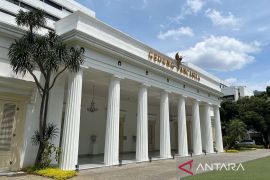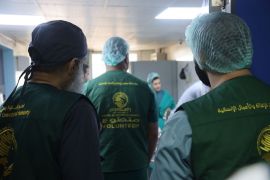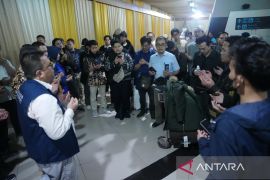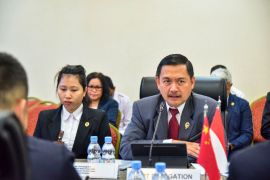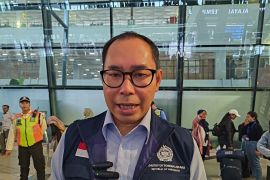The Arab League, which has already imposed economic sanctions, had threatened to take the issue to the U.N. Security Council.
Syrian opposition leaders dismissed the agreement as a new stalling tactic by President Bashar al-Assad`s government and called instead for foreign military intervention to stop Syria`s crackdown on a nine-month-old pro-democracy protest movement.
Damascus said it had been urged to sign by Russia, its long-time ally and arms supplier, which has shown signs of losing patience. Moscow praised the deal as a chance for stability.
In a further sign of international pressure, the United Nations General Assembly voted to condemn Syria`s use of force to quell protests, with Russia and China abstaining instead of voting against.
The Arab League said it was not ready to lift economic sanctions aimed at pressuring Syria to let in monitors, but that an advance delegation would reach Damascus this week.
It would prepare a mission to monitor compliance with an agreement that calls for troops to withdraw from cities where protests have been held, for political prisoners to be freed, and for a dialogue with opposition groups, most of whom are set on following the example of Egypt and others in ending decades of one-man rule.
Insisting that Syria had not been forced into submission, Foreign Minister Walid al-Moualem said he had won several unspecified modifications before signing the deal, which initially allows in observers for one month.
"The Arab League delegation`s reports will be sent to me and the League`s secretary-general at the same time, and he and I will discuss them before any other action is taken," Moualem said. "That is the text after Syria`s modifications."
The remarks were broadcast on Syrian television. Most foreign media have been barred from Syria this year.
"Point of no return"
While many Arab League rulers scarcely take more heed of public opinion than Assad does, they are anxious to calm the situation in Syria and avoid a civil war that could shake a region already riven by rivalries between non-Arab Shi`ite power Iran and Sunni Arab heavyweights such as Saudi Arabia.
Iran, Syria`s` key backer, said the agreement to let in observers from the Arab League was "acceptable", if not ideal.
The U.S. State Department said it was sceptical that the deal would offer much change.
"We are really less interested in a signed piece of paper than we are in actions to implement commitments made," spokeswoman Victoria Nuland told reporters in Washington.
With rebel fighting against the army overshadowing peaceful protests, analysts said the Arab deal would do little to change Syria`s spiralling bloodshed but indicated that Damascus was feeling the international pressure.
"The international and regional isolation is beginning to have an impact on their thinking," said Julien Barnes-Dacey, of Control Risks in London.
"But a point of no return has been passed by both protesters and authorities. They are not going to withdraw (from protest centres) and we are not going to see the end of deaths."
The Syrian Observatory for Human Rights said more than 60 army deserters had been shot dead by machinegun fire as they tried to flee their base, citing accounts from wounded survivors. It also counted 40 civilians shot dead across Syria in the crackdown on protests.
The British-based observatory also said three soldiers had died in fighting with armed rebels backing the opposition in Idlib province. The state news agency SANA said security forces there had killed at least one "terrorist" and wounded several.
One independent opposition figure, Samir Aita, argued that the Arab League plan could be a turning point if it stemmed violence and put peaceful protests back at centre stage: "When the observers are there, there can be peaceful demonstrations and the uprising can get back in the major cities to its peaceful civic stand."
The United Nations says over 5,000 people have died since the protests began. Syria says more than 1,100 security personnel have been killed by foreign-backed "armed terrorist gangs".
Calls for force
Arab foreign ministers voted to impose sanctions last month, after Syria balked at signing the protocol on monitors, and threatened last week to take their plan to the Security Council.
The head of the opposition Syrian National Council criticised Monday`s agreement, which Damascus said would allow protesters into hotspots under Syrian protection.
"Syria`s signature of the Arab League agreement is a lie aimed at winning time and preventing the League from resorting to the United Nations," Burhan Ghalioun told reporters in Tunisia. "We need to use force, even in a limited way, or for Arab defence forces to respond."
Moscow took a step closer to the Western position last Thursday with a surprise draft resolution at the United Nations criticising the bloodshed in Syria.
Western countries complained the text was still too weak but the move may offer more opportunity for international measures, although foreign powers deny plans for intervention.
Syria, a faultline of the Arab-Israeli conflict and regional
sectarian tensions, is a far riskier place to intervene than sparsely populated Libya.
Arab League Secretary-General Nabil Elaraby said sanctions against Syria had not been lifted, but that an Arab foreign ministers` meeting planned for later this week to discuss action
against Damascus had been "postponed indefinitely".
Moualem told journalists that Syria had not requested an end to the sanctions.
"If they think the sanctions will affect Syria`s resistance then they are dreaming, and we won`t beg anyone," he said.
But some observers said there was still little chance that the Assad family`s 41-year rule would survive.
"The situation in Syria is irreversible," said Nadim Shadi of London`s Chatham House think tank. "There is no way any external actors can change it, or that the regime can regain its power." (*)
Editor: Kunto Wibisono
Copyright © ANTARA 2011
